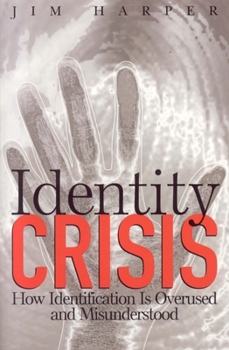Identity Crisis: How Identification Is Overused and Misunderstood
Select Format
Select Condition 
Book Overview
The advance of identification technology biometrics, identity cards, surveillance, databases, dossiers threatens privacy, civil liberties, and related human interests. Since the terrorist attacks of September 11, 2001, demands for identification in the name of security have increased. In this insightful book, Jim Harper takes readers inside identification a process everyone uses every day but few people have ever thought about. Using stories and examples from movies, television, and classic literature, Harper dissects identification processes and technologies, showing how identification works when it works and how it fails when it fails. Harper exposes the myth that identification can protect against future terrorist attacks. He shows that a U.S. national identification card, created by Congress in the REAL ID Act, is a poor way to secure the country or its citizens. A national ID represents a transfer of power from individuals to institutions, and that transfer threatens liberty, enables identity fraud, and subjects people to unwanted surveillance. Instead of a uniform, government-controlled identification system, Harper calls for a competitive, responsive identification and credentialing industry that meets the mix of consumer demands for privacy, security, anonymity, and accountability. Identification should be a risk-reducing strategy in a social system, Harper concludes, not a rivet to pin humans to governmental or economic machinery.
Format:Paperback
Language:English
ISBN:1930865856
ISBN13:9781930865853
Release Date:May 2006
Publisher:Cato Institute
Length:250 Pages
Weight:0.95 lbs.
Dimensions:0.7" x 6.4" x 9.0"
Customer Reviews
3 ratings
Informative Introduction to Identification Theory & Policy
Published by Thriftbooks.com User , 18 years ago
Identity Crisis is a superb primer on identification, identification theory, and identity policy. Citizens and policy-makers faced with threats from international terrorists and a dramatic rise in identity fraud need a good grounding in the uses and abuses of identification in providing security and facilitating daily transactions. This book serves precisely that purpose. Author Jim Harper makes an important distinction between identification and authentication. Differences between the two are nothing to be trifled with. The interests of personal security and privacy hinge upon whether or to what extent either identification or authentication are used by government, private entities, and everyday citizens. Harper persuasively argues that identification is all-too-often overused, and that a process of authentication can often serve our needs most effectively. Most people have probably never given a thought to identification theory. That certainly holds for this reviewer--until I read this book. Identification is largely a common-sense matter, but Harper brings attention to the conceptual depth attendant to this subject. Also interesting are Harper's chapters more narrowly focused on privacy and anonymity. Important legal and constitutional matters are briefly discussed, underscoring the need for appropriate identification policies and practices. Of course, this book is accessible to a general audience and is certainly not limited in its audience to lawyers or to any other specialty. After reading the book, one gets the sense that there is a lot more to say about identification. But a lot of ground is traversed in this work, and the result is highly commendable. Identity Crisis is an important and recommended read.
A thoughtful and critically written dissection of a hot-button social topic
Published by Thriftbooks.com User , 18 years ago
Cato Institute director of Information Policy Studies Jim Harper presents "Identity Crisis: How Identification Is Overused and Misunderstood", is a cautionary book about how increasing identification and computer technology, as well as stepped-up government demands for identification in the wake of the September 11 attacks, are threats to citizen autonomy, privacy, and civil liberties. "Identity Crisis" maintains that resisting endless demands for identification can protect privacy without compromising national security; furthermore, Identity Crisis warns against potential abuses of government power and gives current information about controversies such as the REAL ID Act and other security-related topics. A thoughtful and critically written dissection of a hot-button social topic, "Identity Crises" should be considered "must reading" for all social activists concerned with the growing domination of government into personal lives and liberties of American citizens.
Advance Praise for Identitiy Crisis
Published by Thriftbooks.com User , 18 years ago
"To protect against terrorism, we have to stop individuals before they act. Identity Crisis does the best job I've seen of addressing the real weaknesses in current identification systems and how they correlate directly with further impingements on our privacy and civil liberties. I would have used this book every day to help structure programs and develop policies if I'd had it at TSA." --JUSTIN OBERMAN, former head of credentialing and identity programs, Transportation Security Administration "Few people in America have done the kind of critical thinking about identity and identification that Jim Harper does in this book. An understanding of identity management and policy is essential--not only to leaders in government, but those in the commercial sector as well." --NUALA O'CONNOR KELLY, chief privacy leader, GE, and former chief privacy officer, U.S. Department of Homeland Security





